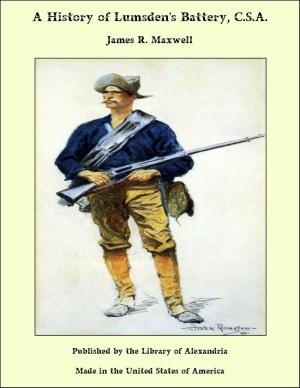The Upas Tree: A Christmas Story for All the Year
Nonfiction, Religion & Spirituality, New Age, History, Fiction & Literature| Author: | Florence Louisa Barclay | ISBN: | 9781465515759 |
| Publisher: | Library of Alexandria | Publication: | March 8, 2015 |
| Imprint: | Language: | English |
| Author: | Florence Louisa Barclay |
| ISBN: | 9781465515759 |
| Publisher: | Library of Alexandria |
| Publication: | March 8, 2015 |
| Imprint: | |
| Language: | English |
Ronald West stood at the window of his wife's sitting-room, looking across the bright garden-borders to the wide park beyond, and wondering how on earth he should open the subject of which his mind had been full during their morning ride. He had swung off his own horse a few moments before; thrown the bridle to a waiting groom, and made his way round to her stirrup. Then he had laid his hand upon Silverheels' mane, and looking up into his wife's glowing, handsome face, he had said: "May I come to your room for a talk, Helen? I have something very important to tell you." Helen had smiled down upon him. "I thought my cavalier was miles away from his horse and his wife, during most of the ride. But, if he proposes taking me on the same distant journey, he shall be forgiven. Also, I have something to tell you, Ronnie, and I see the turret clock gives us an hour before luncheon. I must scribble out a message for the village; then I will come to you at once, without stopping to change." She laid her hand on his shoulder, and dropped lightly to the ground. Then, telling the groom to wait, she passed into the hall. Ronald left her standing at the table, walked into the sitting-room alone, and suddenly realised that when you have thought of a thing continuously, day and night, during the best part of a week, and kept it to yourself, it is not easy to begin explaining it to another person—even though that other person be your always kind, always understanding, altogether perfect wife! He had forgotten to leave his hat and gloves in the hall. He now tossed them into a chair—Helen's own particular chair it so happened—but kept his riding-crop in his hand, and thwacked his leather gaiters with it, as he stood in the bay window. It was such a perfect spring morning! The sun shone in through the old-fashioned lattice panes. Some silly old person of a bygone century had scratched with a diamond on one of these a rough cross, and beneath it the motto: In hoc vince. Ronald had inveighed against this. If Helen's old ancestor, having nothing better to do, had wanted to write down a Latin motto, he should have put it in his pocket-book, or, better still, on the even more transitory pages of the blotter, instead of scribbling on the beautiful diamond panes of the old Grange windows. But Helen had laughed and said: "I should think he lived before the time of blotters, dear! No doubt the morning sun was shining on the glass, Ronnie, as he stood at the window. It was of the cross gleaming in the sunlight, that he wrote: In this conquer. If we could but remember it, the path of self-sacrifice and clear shining is always the way to victory."
Ronald West stood at the window of his wife's sitting-room, looking across the bright garden-borders to the wide park beyond, and wondering how on earth he should open the subject of which his mind had been full during their morning ride. He had swung off his own horse a few moments before; thrown the bridle to a waiting groom, and made his way round to her stirrup. Then he had laid his hand upon Silverheels' mane, and looking up into his wife's glowing, handsome face, he had said: "May I come to your room for a talk, Helen? I have something very important to tell you." Helen had smiled down upon him. "I thought my cavalier was miles away from his horse and his wife, during most of the ride. But, if he proposes taking me on the same distant journey, he shall be forgiven. Also, I have something to tell you, Ronnie, and I see the turret clock gives us an hour before luncheon. I must scribble out a message for the village; then I will come to you at once, without stopping to change." She laid her hand on his shoulder, and dropped lightly to the ground. Then, telling the groom to wait, she passed into the hall. Ronald left her standing at the table, walked into the sitting-room alone, and suddenly realised that when you have thought of a thing continuously, day and night, during the best part of a week, and kept it to yourself, it is not easy to begin explaining it to another person—even though that other person be your always kind, always understanding, altogether perfect wife! He had forgotten to leave his hat and gloves in the hall. He now tossed them into a chair—Helen's own particular chair it so happened—but kept his riding-crop in his hand, and thwacked his leather gaiters with it, as he stood in the bay window. It was such a perfect spring morning! The sun shone in through the old-fashioned lattice panes. Some silly old person of a bygone century had scratched with a diamond on one of these a rough cross, and beneath it the motto: In hoc vince. Ronald had inveighed against this. If Helen's old ancestor, having nothing better to do, had wanted to write down a Latin motto, he should have put it in his pocket-book, or, better still, on the even more transitory pages of the blotter, instead of scribbling on the beautiful diamond panes of the old Grange windows. But Helen had laughed and said: "I should think he lived before the time of blotters, dear! No doubt the morning sun was shining on the glass, Ronnie, as he stood at the window. It was of the cross gleaming in the sunlight, that he wrote: In this conquer. If we could but remember it, the path of self-sacrifice and clear shining is always the way to victory."















